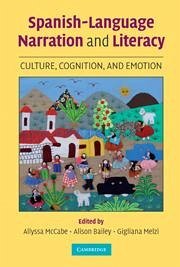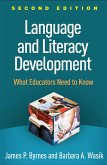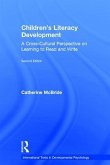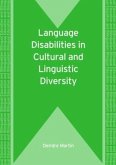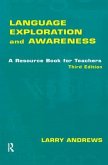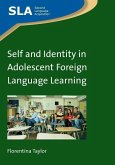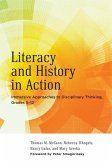Spanish-Language Narration and Literacy
Culture, Cognition, and Emotion
Herausgeber: McCabe, Allyssa; Melzi, Gigliana; Bailey, Alison L
Spanish-Language Narration and Literacy
Culture, Cognition, and Emotion
Herausgeber: McCabe, Allyssa; Melzi, Gigliana; Bailey, Alison L
- Gebundenes Buch
- Merkliste
- Auf die Merkliste
- Bewerten Bewerten
- Teilen
- Produkt teilen
- Produkterinnerung
- Produkterinnerung
Deepens our understanding of narration in Latino cultures, methods of thinking and expressing emotion, and implications for school achievement.
Andere Kunden interessierten sich auch für
![Language and Literacy Development Language and Literacy Development]() James P ByrnesLanguage and Literacy Development106,99 €
James P ByrnesLanguage and Literacy Development106,99 €![Children's Literacy Development Children's Literacy Development]() Catherine McbrideChildren's Literacy Development206,99 €
Catherine McbrideChildren's Literacy Development206,99 €![Positive Psychology Perspectives on Foreign Language Learning Positive Psychology Perspectives on Foreign Language Learning]() Positive Psychology Perspectives on Foreign Language Learning156,99 €
Positive Psychology Perspectives on Foreign Language Learning156,99 €![Language Disabilities in Cultural and Linguistic Diversity Language Disabilities in Cultural and Linguistic Diversity]() Deirdre MartinLanguage Disabilities in Cultural and Linguistic Diversity167,99 €
Deirdre MartinLanguage Disabilities in Cultural and Linguistic Diversity167,99 €![Language Exploration and Awareness Language Exploration and Awareness]() Larry AndrewsLanguage Exploration and Awareness202,99 €
Larry AndrewsLanguage Exploration and Awareness202,99 €![Self and Identity in Adolescent Foreign Language Learning Self and Identity in Adolescent Foreign Language Learning]() Florentina TaylorSelf and Identity in Adolescent Foreign Language Learning156,99 €
Florentina TaylorSelf and Identity in Adolescent Foreign Language Learning156,99 €![Literacy and History in Action Literacy and History in Action]() Thomas M McCannLiteracy and History in Action94,99 €
Thomas M McCannLiteracy and History in Action94,99 €-
-
-
Deepens our understanding of narration in Latino cultures, methods of thinking and expressing emotion, and implications for school achievement.
Hinweis: Dieser Artikel kann nur an eine deutsche Lieferadresse ausgeliefert werden.
Hinweis: Dieser Artikel kann nur an eine deutsche Lieferadresse ausgeliefert werden.
Produktdetails
- Produktdetails
- Verlag: Cambridge-Hitachi
- Seitenzahl: 382
- Erscheinungstermin: 8. September 2008
- Englisch
- Abmessung: 229mm x 155mm x 25mm
- Gewicht: 635g
- ISBN-13: 9780521883757
- ISBN-10: 052188375X
- Artikelnr.: 25427300
- Herstellerkennzeichnung
- Libri GmbH
- Europaallee 1
- 36244 Bad Hersfeld
- gpsr@libri.de
- Verlag: Cambridge-Hitachi
- Seitenzahl: 382
- Erscheinungstermin: 8. September 2008
- Englisch
- Abmessung: 229mm x 155mm x 25mm
- Gewicht: 635g
- ISBN-13: 9780521883757
- ISBN-10: 052188375X
- Artikelnr.: 25427300
- Herstellerkennzeichnung
- Libri GmbH
- Europaallee 1
- 36244 Bad Hersfeld
- gpsr@libri.de
1. Introduction Alison Bailey, Allyssa McCabe and Gigliana Melzi; Part I.
Parent-Child Interaction: 2. Cultural variations in mother-child narrative
discourse style Margaret Caspe and Gigliana Melzi; 3. Early
socio-communicative narrative patterns during Costa Rican mother-infant
interaction Pablo Stansbery; 4. Lessons in mother-child and father-child
personal narratives in Latino families Tonia N. Cristofaro and Catherine S.
Tamis-LeMonda; 5. Evaluation in Spanish-speaking mother-child narratives:
the social and sense-making function of internal state references Camila
Fernández and Gigliana Melzi; 6. Love, diminutives, and gender
socialization in Andean mother-child narrative conversations Kendall A.
King and Colleen Gallagher; Part II. Developing Independent Narration: 7.
The intersection of language and culture among Mexican-heritage children
three to seven years old Alison Wishard Guerra; 8. Beyond chronicity:
evaluation and temporality in Spanish-speaking children's personal
narratives Paola Uccelli; 9. Narrative stance in Venezuelan children's
stories Martha Shiro; 10. Mestizaje: Afro-Caribbean and indigenous Costa
Rican children's narratives and links with other traditions C. Nicholas
Cuneo, Allyssa McCab, and Gigliana Melzi; Part III. Links to Literacy and
Other School Achievements: 11. Latino mothers and their preschool children
talk about the past Alison Sparks; 12. The contribution of Spanish-language
narration to the assessment of early academic performance of Latino
students Alison L. Bailey, Ani Moughamian and Mary Dingle; 13. Cultural
variation in narrative competence and its implications for children's
academic success Sarah W. Beck.
Parent-Child Interaction: 2. Cultural variations in mother-child narrative
discourse style Margaret Caspe and Gigliana Melzi; 3. Early
socio-communicative narrative patterns during Costa Rican mother-infant
interaction Pablo Stansbery; 4. Lessons in mother-child and father-child
personal narratives in Latino families Tonia N. Cristofaro and Catherine S.
Tamis-LeMonda; 5. Evaluation in Spanish-speaking mother-child narratives:
the social and sense-making function of internal state references Camila
Fernández and Gigliana Melzi; 6. Love, diminutives, and gender
socialization in Andean mother-child narrative conversations Kendall A.
King and Colleen Gallagher; Part II. Developing Independent Narration: 7.
The intersection of language and culture among Mexican-heritage children
three to seven years old Alison Wishard Guerra; 8. Beyond chronicity:
evaluation and temporality in Spanish-speaking children's personal
narratives Paola Uccelli; 9. Narrative stance in Venezuelan children's
stories Martha Shiro; 10. Mestizaje: Afro-Caribbean and indigenous Costa
Rican children's narratives and links with other traditions C. Nicholas
Cuneo, Allyssa McCab, and Gigliana Melzi; Part III. Links to Literacy and
Other School Achievements: 11. Latino mothers and their preschool children
talk about the past Alison Sparks; 12. The contribution of Spanish-language
narration to the assessment of early academic performance of Latino
students Alison L. Bailey, Ani Moughamian and Mary Dingle; 13. Cultural
variation in narrative competence and its implications for children's
academic success Sarah W. Beck.
1. Introduction Alison Bailey, Allyssa McCabe and Gigliana Melzi; Part I.
Parent-Child Interaction: 2. Cultural variations in mother-child narrative
discourse style Margaret Caspe and Gigliana Melzi; 3. Early
socio-communicative narrative patterns during Costa Rican mother-infant
interaction Pablo Stansbery; 4. Lessons in mother-child and father-child
personal narratives in Latino families Tonia N. Cristofaro and Catherine S.
Tamis-LeMonda; 5. Evaluation in Spanish-speaking mother-child narratives:
the social and sense-making function of internal state references Camila
Fernández and Gigliana Melzi; 6. Love, diminutives, and gender
socialization in Andean mother-child narrative conversations Kendall A.
King and Colleen Gallagher; Part II. Developing Independent Narration: 7.
The intersection of language and culture among Mexican-heritage children
three to seven years old Alison Wishard Guerra; 8. Beyond chronicity:
evaluation and temporality in Spanish-speaking children's personal
narratives Paola Uccelli; 9. Narrative stance in Venezuelan children's
stories Martha Shiro; 10. Mestizaje: Afro-Caribbean and indigenous Costa
Rican children's narratives and links with other traditions C. Nicholas
Cuneo, Allyssa McCab, and Gigliana Melzi; Part III. Links to Literacy and
Other School Achievements: 11. Latino mothers and their preschool children
talk about the past Alison Sparks; 12. The contribution of Spanish-language
narration to the assessment of early academic performance of Latino
students Alison L. Bailey, Ani Moughamian and Mary Dingle; 13. Cultural
variation in narrative competence and its implications for children's
academic success Sarah W. Beck.
Parent-Child Interaction: 2. Cultural variations in mother-child narrative
discourse style Margaret Caspe and Gigliana Melzi; 3. Early
socio-communicative narrative patterns during Costa Rican mother-infant
interaction Pablo Stansbery; 4. Lessons in mother-child and father-child
personal narratives in Latino families Tonia N. Cristofaro and Catherine S.
Tamis-LeMonda; 5. Evaluation in Spanish-speaking mother-child narratives:
the social and sense-making function of internal state references Camila
Fernández and Gigliana Melzi; 6. Love, diminutives, and gender
socialization in Andean mother-child narrative conversations Kendall A.
King and Colleen Gallagher; Part II. Developing Independent Narration: 7.
The intersection of language and culture among Mexican-heritage children
three to seven years old Alison Wishard Guerra; 8. Beyond chronicity:
evaluation and temporality in Spanish-speaking children's personal
narratives Paola Uccelli; 9. Narrative stance in Venezuelan children's
stories Martha Shiro; 10. Mestizaje: Afro-Caribbean and indigenous Costa
Rican children's narratives and links with other traditions C. Nicholas
Cuneo, Allyssa McCab, and Gigliana Melzi; Part III. Links to Literacy and
Other School Achievements: 11. Latino mothers and their preschool children
talk about the past Alison Sparks; 12. The contribution of Spanish-language
narration to the assessment of early academic performance of Latino
students Alison L. Bailey, Ani Moughamian and Mary Dingle; 13. Cultural
variation in narrative competence and its implications for children's
academic success Sarah W. Beck.

